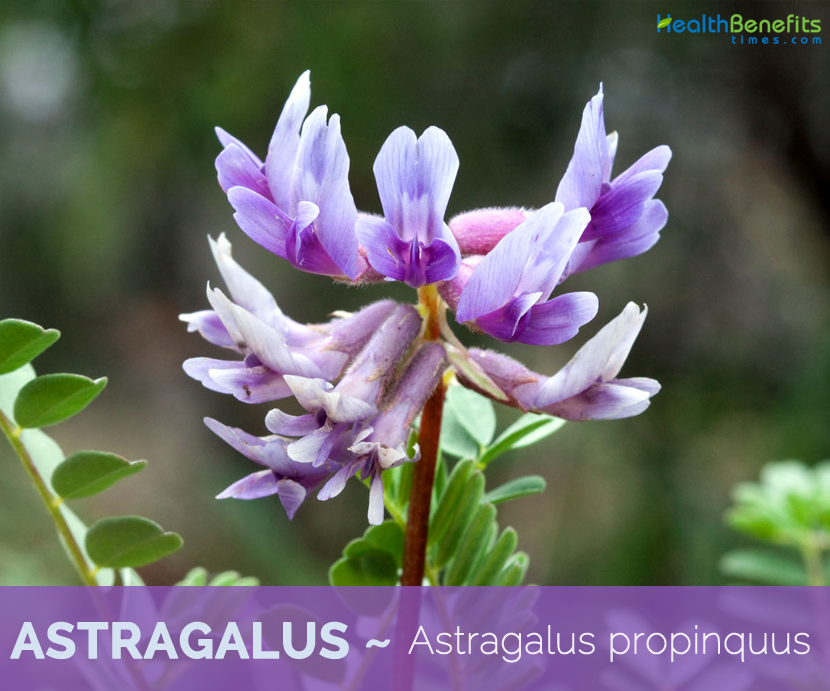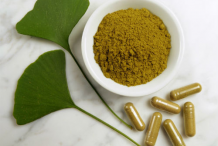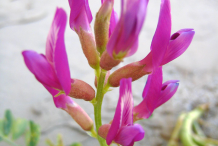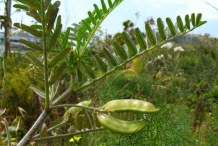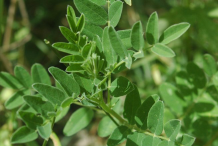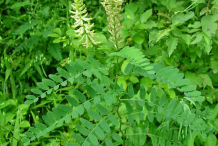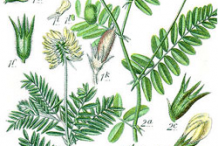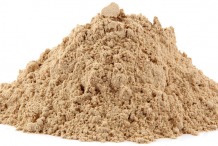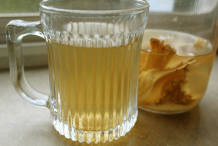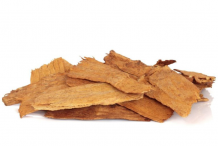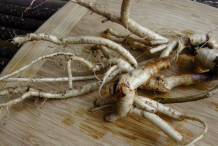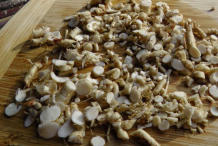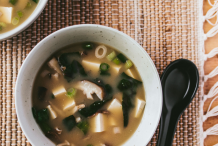Plant
Astragalus is an herbaceous perennial plant that grows about 16 to 36 inches (three feet) tall. It grows well in grassy regions and on mountainsides, requiring plenty of exposure to the sun. The plant prefers sandy, well-drained, well loosened soil and free of stones or debris. Sandy soil is ideal because it allows good root growth. Root is cylindrical, not usually branched, 30 –90 cm long, and covered with a tough, yellowish-brown skin with a sweet white inner pulp. Its roots are used in traditional Chinese Medicine, in which it’s been used as an adaptogen for thousands of years, meaning it helps the body fight off stress and disease. The plant has short vertical or raised, hairy stems.
Leaves & fruit
Leaves made up of 12 to 18 pairs of leaflets. Leaflet blade is wide oval or elliptical, and pubescent below. Stipules are lanceolate. Racemes are axillary. The plant has a dense brush of white or yellow flowers in the appearance reminiscent of peas. Flowering normally occurs from June to July. Fruit is oval or egg-shaped beans. Seeds are small and kidney shaped. Roots are used in traditional Chinese Medicine, in which it’s been used as an adaptogen for thousands of years. The roots are traditionally harvested when the plant is between 4-5 years old and sliced when fresh into long thin strips that look like tongue depressors. The root has sweet, warming taste.
Health Benefits of Astragalus
Known as Astragalus Propinquus scientifically, the roots of this herb are known to heal different health conditions. Thanks to its healing properties, including antiviral, antibacterial, adaptogenic, anti-hydrotic, anti-inflammatory, antioxidative, anti-hypertensive, and anti-cancerous properties, the herb is an essential part of several alternative branches of medicine. Listed below are few of the health benefits of Astragalus
1. Helps Maintain Cholesterol Levels
Regular intake of astragalus roots is known to reduce bad cholesterol in the blood. Roots curb the absorption of fat from intestines, plus it also acts as a natural detoxification agent. It maintains your arterial walls from the deposits of plaques and shields you from many conditions, including atherosclerosis.
2. Prevent Diabetes
Astragalus could effectively control blood glucose, reduce the free radicals, and encourage the antioxidative activity and may play a role in the treatment of gestational diabetes in pregnant women. It helps to reduce insulin resistance and ER stress induced by high glucose in animals.
Astragalus improved fasting blood glucose levels, glomerular filtration rate (GFR), urinary albumin rate and thickness of the glomerular basement membrane in diabetic rat models. It can increase pancreatic beta cell mass in type 1 diabetic mice strongly associated with an improved autoimmunity.(1), (2), (3), (4)
3. Prevent Respiratory Problems
Astragalus played an important role in preventing the recurrence of asthma in children. A combination of astragalus and hormones showed better effects.
Astragalus could prevent the development of chronic asthma, therefore reducing asthma attacks in an ovalbumin sensitized mouse model exposed to repeated Ovalbumin. It may reduce the incidence of Upper Respiratory Tract Infection (URTI) in children with nephrotic syndrome.(5),(6), (7)
4. Prevents Memory Loss
Astragalus helps to enhance the functional recovery in intracerebral hemorrhagic stroke patients. Astragalus injection is an effective drug for the treatment of elderly patients with chronic primary insomnia and has fewer side effects.
Astragalus extract improves nerve injury after brain restriction of blood (ischemia) in mice. Astragalus could be used for curing Parkinson’s disease; it decreased the levels of dopamines in 6-hydroxydopamine induced substantia neuron cells. Extract of Astragalus had protective effects on DEX (dexamethasone)-induced neuron injury mouse model. Active components of Astragalus reduced iron overload in Alzheimer’s disease brain model of rat.(8), (9), (10), (11), (12), (13)
5. Reduces Fatigue
Astragalus helps to reduce fatigue by increasing the oxygen uptake and the systemic utility of oxygen in athletes. It can significantly reduce the exercise induced physical fatigue of altitude induced low oxygen mice and improved exercise performance in trained mice. Astragalus flavonoids decrease chronic fatigue syndrome induced by food intake restriction plus forced swimming in rats.(14), (15), (16), (17)
6. Combats Stress
High anxiety and chronic stress can be very dangerous, as stress hormones can cause havoc on a healthy system when not kept in check. Thus, finding ways to relax is essential, and astragalus has been credited to reduced stress levels and a general promotion of peace and calm. For those suffering from mood swings and constant nervous tension, astragalus can rebalance your hormonal levels.(18), (19)
7. Protects the Liver
Oral administration of alcoholic extract of Astragalus root reduced the liver injury induced by stilbenemidine. Consumption of Traditional Chinese Medicine may be useful in preventing and improving fatty liver induced by alcohol.(20), (21)
8. Anti-Aging
Everyone wants to “live forever”. There has been a great deal of research done on the effects of astragalus and its antioxidant potential. It can considerably help to decrease signs of aging on the face, promote regrowth of tissue, remove free radicals, and prevent or reverse chronic illness symptoms. More and more people are turning to astragalus for its obvious anti-aging effects. This is particularly accurate for the skin, and for blemishes, wrinkles, and age spots, astragalus extract can be a powerful remedy.(22)
9. Improve Male Fertility
Astragalus revealed a significant stimulatory effect and increased the motility of human sperms in lab. Astragalus has beneficial effects and is able to improve relative testes weight, sperm parameters and cAMP-responsive element modulator (CREM) expression against CP-induced reproductive toxicity in male mice.
Astragalus could significantly reduce the apoptosis of spermatogenic cells, decrease the level of fat peroxidation and protect glutathione activity in the torsional testis.(23), (24)
10. Helps Bone Function
Astragalus extracts considerably improved bone mineral density, biochemical density and ash weight of the femur and tibia in rats with their ovaries taken out. When combined with supplemental calcium it could also be more protective against the calcium loss in calcium-insufficient postmenopausal women.(25)
11. Prevents the Growth of Tumors
Research has shown the success of astragalus saponins, flavonoids and polysaccharides in decreasing or eliminating tumors. In cases of chemoresistance treating liver cancer, astragalus has shown potential in reversing multidrug resistance and as an addition to conventional chemotherapy, according to a research published in the Journal of Pharmacy and Pharmacology.(26)
12. Effective in Wound Healing
Topical application of Astragalus has useful effects in the acceleration of skin wound contraction and healing. Astragalus decreased Catenin beta-1 to increase skin cell migration and propagation; hence it could promote ulcerated wound healing in cultured mouse keratinocytes.
Astragalus has shown to be a promising natural product with both healing and anti-scar effects for wound treatment. These findings suggest the use of Astragalus in the treatment of injury.(27), (28), (29), (30)
13. Allergy Relief
Millions of people suffer through seasonal allergies during fall and spring. Astragalus root extract has shown great potential in reducing the severity of allergic reactions. Although the chemical pathway isn’t completely understood, it is supposed that the chemical components in astragalus help to prevent the release of histamines, which cause the allergic reactions, such as runny noses, itchy eyes, and other irritating symptoms.(31)
14. Protect the Intestine
Astragalus helps to strengthen the movement and muscle tonus in the intestine. High dose of Astragalus has a protective effect on hemorrhagic shock-reperfusion injury of the intestinal mucosa. Astragalus Polysaccharide effectively reduces TNBS induced experimental colitis in rats.(32),(33),(34)
15. Treats Colds and Flu
Astragalus has antiviral capabilities so it has long been used to treat common colds and the flu. It’s commonly combined with other herbs like ginseng, angelica and licorice. As with many other natural cold remedies, it seems to work better when used when healthy individuals use the supplement regularly in order to prevent the illness before it happens. Regular use of astragalus before the colder months of winter is said to prevent or decrease the number of colds and upper respiratory illnesses individuals will have throughout the season.(35)
16. Reduces Sleep Issues
Insomnia, sleeplessness, interrupted sleep patterns can be cured by regular consumption of astragalus root. By improving overall health, metabolism and hormonal balance this root can help in delivering a peaceful sleep.
Heath benefits of Using Astragalus during Pregnancy
Astragalus is the herb that enhances the healthy gestation phase. Let’s talk about the health benefits of Astragalus during pregnancy:
1. Minimizes fatigue and Re-energizes
As the body utilizes energy, one might experience weakness and fatigue. Astragalus assists to restore the level of energy. It enhances the stamina and eliminates fatigue during pregnancy.
2. Strengthens immunity
Astragalus boosts and vitalizes immunity during the delicate phase of pregnancy. It alleviates the gestational diabetes, microbial infections and other ailments.
3. Promotes smooth functioning of liver
During pregnancy, a hormone generates more hormones than during normal period. Astragalus enhances the liver function. It also repairs the damage of liver.
4. Lowers Pre-Eclampsia risk
Astragalus prevents the risk of pre-eclampsia, obesity, autoimmune disease, sickle, PCOS, sickle cell disease or hypertension. This herb could be combined with liver protectors such as dandelion and milk thistle.
5. Treats flatulence and constipation
The increase in progesterone reduces the digestion process and results to flatulence. Astragalus relieves the problem of gas, flatulence and constipation. The pregnant women who suffer from constipation should use Astragalus to alleviate constipation.
6. Remedy for allergies in pregnancy
Certain allergies might be experienced during pregnancy. So Astragalus should be used to relieve the several allergy symptoms.
7. Cures bladder infection and kidney stones
Astragalus cures the infection of urinary bladder and also prevents the kidney stones during pregnancy. It enhances the smooth functioning of the liver.
Ayurvedic Health benefits of Astragalus
- Allergies: Prepare dried root tincture. Drink twice a day. It will give you relief from Allergic Rhinitis or Hay fever.
- Tumors: Prepare a root decoction. Take half cup two times a day.
- Arrhythmia: Cut the roots of Astragalus into small pieces. Prepare an infusion of the roots. Drink 2-3 cups a day.
- Liver: Take Astragalus roots. Wash them. Prepare a decoction. Drink half cup daily.
- Bladder Cancer: Have Astragalus capsules. (500 mg three times a day.)
- Autism: Prepare a root decoction of Astragalus. Have two cups two times a day.
- Immunity Booster: Grind Astragalus root to make paste. Take 4 g of it once a day with lukewarm water.
- High Creatinine: Boil a handful of dried Astragalus root slices in 1/4 th of water for half an hour. Now strain and drink the tea. Drink it every day between the meals.
- Bone Infection: Put half teaspoon of Astragalus powdered roots in one cup of water. Boil it. Simmer for 10 minutes. Drink thrice daily.
- Encephalopathy: Have Astragalus extract. (250 mg four times a day.)
- Epstein Barr Virus: Take 250 mg of Astragalus extracts four times a day.
- Avian Flu: Take 1 tsp of dried Astragalus herb in powdered form. Consume it 3-4 times a day.
- Keshan Disease: Have Astragalus capsules, 500 mg twice a day.
- Kidney Cancer: Take Astragalus extracts 500 mg twice a day.
- Leucopenia: Take 250 mg of Astragalus root extracts two times a day.
- Myeloma: Take Astragalus extracts 250 mg thrice daily.
- Pituitary Tumors: Take 500 mg of Astragalus extracts, once a day.
- Reproductive Problems of Males: Add 1 tbsp of dried Astragalus root in one cup of water. Boil it for 30 minutes. Let it cool. Drink it once a day.
- Heart Enlarged: Boil Fresh Astragalus roots in 150 ml of water for 5 to 10 minutes. Strain off this decoction. Drink a cup of it daily to prevent cardiac problems.
- Cervical Cancer: Have 1 tbsp of Astragalus root powder daily.
- Cancer: Have a cup of Astragalus root decoction every day. It works against the growth of Cancer cells.
- Cervical Erosion: Have 1 tbsp of Astragalus root powder daily OR Have a cup of Astragalus root tea every day.
- Azoospermia: Prepare a decoction of Astragalus root and dried Knotgrass. Drink 2-3 times a day. Astragalus increases sperm’s survival rate and knotgrass improves the fertility.
Other Traditional Medicinal uses of Astragalus
- In Traditional Chinese Medicine, the herb was hailed as a protector against stresses, both mental and physical.
- An herbal mixture containing astragalus is used to treat coronary artery disease in China.
- Astragalus is suggested for Spleen deficiency symptoms, such as diarrhea, fatigue, sweating, and lack of appetite.
- It is used as a tonic for the Lungs and is good for shortness of breath, asthma, and chronic lung problems.
- Astragalus is recommended for arthritis, diarrhea, and nervous symptoms.
- It is often given to people who are in a state of generally poor or weakened health.
- Astragalus is used orally for treating breast cancer, cervical cancer, and lung cancer.
Dosages
Astragalus comes in different forms, most of which is extracted from the root. These forms include astragalus powder, herbal decoctions, capsules and ointments. These astragalus products are usually ingested to help the body deal with viruses and infections. The dosages, however, differ depending on the form.
Here is a list of the recommended doses for the above-mentioned astragalus products. Always consult your physician before taking any of these, particularly if you’re dealing with a medical condition:
| Astragalus Quick Facts | |
|---|---|
| Name: | Astragalus |
| Scientific Name: | Astragalus propinquus |
| Origin | North and eastern regions of China |
| Colors | Yellowish to brown (Root) |
| Shapes | Cylindrical, not usually branched, 30 –90 cm long, and covered with a tough, yellowish-brown skin |
| Flesh colors | Woody and yellowish to white |
| Taste | Faint and slightly sweet taste |
| Health benefits | Prevent Respiratory Problems and Prevent Diabetes |
| Tea/Herbal Decoction | 3 to 6 grams dried root per 12 ounces of water, thrice a day |
| Astragalus Root Powder | 250 to 500 milligrams, 3 to 4 times a day |
| Capsules | 2 to 3 capsules (500 milligrams) per day |
| Astragalus Root Extract (Liquid) or Tincture | 2 to 4 milliliters, thrice a day |
As an ointment, astragalus extract can also be used on wounds to promote healing and to avoid infections. The ointment should only be composed of 10 percent astragalus and should be applied on the skin’s surface. However, it should not be applied to open wounds without consulting a health practitioner first.
How to Make Astragalus Oil
Materials:
- Astragalus root
- Carrier oil (serves as your base; popular choices include sweet almond, coconut, and olive oil)
- Spoon for mixing
- Unbleached cheesecloth, muslin or fine gauze
- Double boiler or a crockpot
- Glass jar for storage
Procedure:
- Combine the herbs and the oil in the double boiler. The ideal ratio would be 1 cup of carrier oil to every ¼ ounce of astragalus.
- Heat slowly over low heat (140 degrees Fahrenheit) for six to eight hours.
- When done, strain the mixture and transfer it to a glass jar (or any container of your choice).
Recipes
Astragalus Root Tea
When you feel a cold or the flu coming in, this astragalus tea recipe will help your immune system counter the viruses that are currently at work.
Ingredients:
- 10 g dried astragalus root slices or astragalus powder
- 1 g red tea leaves or 1 red tea bag
- 500 ml water
Procedure:
- Add the slices or powder to water and bring to a boil in a small saucepan. Let it boil for about 5 minutes.
- Remove the slices from the water or strain the water.
- Place the tea bag in a cup and pour the astragalus water into the cup.
- Steep the tea bag for a couple of minutes.
- Pour the astragalus tea in a thermal flask and sip it slowly throughout the day.
Astragalus Chicken Soup
Chicken soup has always been credited to helping restore the body’s healthy state whenever you’re sick. By incorporating the astragalus herb into this recipe, you’re actually ensuring that your body has the means to help fight the cause of your symptoms.
Ingredients:
- 1 free-range organic chicken thigh
- 4 slices of astragalus
- 8 red dates
- 1 tbsp. goji berries
- 500 ml water
Procedure
- Wash and clean the chicken thigh. Trim away excess fat and skin.
- Parboil the chicken thigh.
- Soak the Chinese herbs (astragalus, red dates and goji berries) for a short while.
- Cut the red dates into halves and remove the seeds.
- Place all the ingredients into the double-boiling jar.
- Pour cold water into the jar, enough to cover the ingredients.
- Place the jar into a deep pot and fill the pot with water until the jar is half submerged.
- Bring the pot of water to a boil, lower the heat to a simmer and cook for about 1 hour.
- Add salt to taste before serving.
Other Facts
- The root of the astragalus plant is put in soups, teas, extracts, or capsules.
Precautions
- Do not take if you are taking immunosuppressant such as tacrolimus and cyclosporine.
- Do not take if you have a hormone-sensitive cancer: Because astragalus has demonstrated estrogenic effects.
- Do not take if you are undergoing cancer treatment.
- Do not take if you are taking anticoagulants.
- Do not take if you are undergoing surgery.
- Do not take if you are taking diuretic medications.
- Do not take if you are taking blood pressure medications.
- Pregnant and lactating women should not take this herb.
- Children with a fever should not take astragalus because it may increase the fever and result in it lasting longer.
Side effects of using Astragalus during pregnancy
Astragalus has some side effects which are listed below:
Birth Defects and Malformations
Astragalus can cause the fetal malformations and birth defects such as heart defect in the fetus. During pregnancy, the use of locoweed should be avoided.
Miscarriage
The use of locoweed during pregnancy should be avoided because it might result to miscarriage or abortion. The other side effects are hives, swelling of face, breathing difficulties, uneasiness in the chest, digestive discomfort, nausea and rash.
References:
https://www.mskcc.org/cancer-care/integrative-medicine/herbs/astragalus
http://m.longwoodherbal.org/astragalus/astragalus.PDF
https://en.wikipedia.org/wiki/Astragalus
https://nccih.nih.gov/health/astragalus
http://www.umm.edu/health/medical/altmed/herb/astragalus
https://en.wikipedia.org/wiki/Astragalus_propinquus
http://www.theplantlist.org/tpl1.1/record/ild-31282
https://plants.usda.gov/core/profile?symbol=astra
http://cam-cancer.org/The-Summaries/Herbal-products/Milk-vetch-Astragalus-mongholicus/What-is-it


